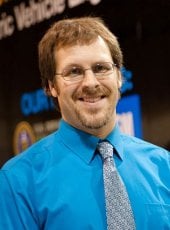About APS LABS
The Advanced Power Systems Research Center is a multidisciplinary organization that fosters large, collaborative, cutting-edge
research efforts in the areas of clean, efficient, and sustainable Power Systems technologies.
The goal is developing the fundamental and applied knowledge required for the next
generation of low-emission, high-efficiency vehicles. The Center brings together and
coordinates researchers with expertise in and a passion for current and future automotive technologies.
Although APS LABS is a physical place, you might best know of it by its mobile, expandable
laboratory, which is pulled by a class 8-semi truck with a Detroit Diesel DD15 engine.
This behemoth vehicle, which serves as an on-the-road school, a lab, and a training
center truly exemplifies innovation on wheels.
Along with its research, APS LABS is both well-known and respected for offering customizable
on-site and online automotive courses, in 35 system and subsystem areas, which provide
people in the automotive industry with the fundamental competencies and skills they
need to keep pace with technology and upskill their careers. For several years now,
the expert team at APS has supplied the automotive industry with resources, outreach
services, training, and talent.
Current Short Courses
Batteries and Electrification
Battery and High Voltage Safety
OVERVIEW
This noncredit, professional learning course uses a mix of theory and practical, hands-on activities
to ensure that participants can retain and apply knowledge and skills. Its content
is ideal for those beginning to work in automotive propulsion systems; those working
in or associated with the automotive industry who need a refresher; or those working
in these systems who require safety training. First responders, design engineers,
and systems engineers will benefit from this course, as well as those in engineering
management and engineering sales.
COURSE CONTENT
The course will cover several topics; battery chemistry, basic hazards associated
with high voltage (both AC and DC), the use Personal Protective Equipment (PPE), safe
operating procedures, and best practices for emergency response.
OTHER DETAILS
- Duration: 4 / 8 / 20 contact hours. Students who successfully finish the course will receive
a certificate of completion.
- Instructor (for contact): Vinicius Bonfochi Vinhaes
- Instructional Team: Naber, Bonfochi Vinhaes, Ovist, and Worm
- Modality: F2F, Live/Online, Asynchronous Online
- Cost: Varies with Modality
Electric Propulsion Systems
OVERVIEW
This noncredit, professional learning course uses a mix of theory and practical, hands-on activities
to ensure that participants can retain and apply knowledge and skills. Its content
is ideal for design engineers, systems engineers, and technicians; as well as those
in engineering sales and management.
COURSE CONTENT
The course begins with an overview of the continuing need for propulsion system electrification,
as well as its opportunities and challenges. Learners will examine sub-system operation,
energy flow, architecture, and systems level integration of Hybrid Electric Vehicles
(HEV) and Battery Electric Vehicles (BEV). Each of the major subsystems are covered
with specific application to ground vehicles.
OTHER DETAILS
- Duration: 20 contact hours. Students who successfully finish the course will receive a certificate
of completion.
- Instructor (for contact): Vinicius Bonfochi Vinhaes
- Instructional Team: Naber, Bonfochi Vinhaes, Ovist, and Worm
- Modality: F2F, Live/Online, Asynchronous Online
- Cost: Varies with Modality
Electrified Machines and Power Electronics
OVERVIEW
This noncredit, professional learning course is designed for students who want to develop advanced
knowledge in Electric Machines and Power Electronics. This course is ideal for engineers,
technicians, managers, and others who want to advance their knowledge in this area.
COURSE CONTENT
The course includes several relevant topics and their associated competencies: analyzing
the detailed operating principles of electric machines and power electronics; conducting
dynamic analyses of electric machines; referencing frame transitions; constructing
both reduced order and digital simulations; analyzing the impacts of harmonics, switching
conversions, and pulse-width modulation.
OTHER DETAILS
- Duration: 20 contact hours. Students who successfully finish the course will receive a certificate
of completion.
- Instructor (for contact): Vinicius Bonfochi Vinhaes
- Instructional Team: Naber, Bonfochi Vinhaes, Ovist, and Worm
- Modality: F2F, Live/Online, Asynchronous Online
- Cost: Varies with Modality
Engines
Diesel Engine Fundamentals
OVERVIEW
This noncredit, professional learning course is designed for students who want to gain foundational
knowledge in diesel engines. Its content is ideal for those who are interested in
pursuing a career in the automotive industry, commercial vehicles, power generation,
or related fields. Students will learn through a combination of instructor-led lectures,
lab lectures, and demonstrations. Throughout, they will interact directly with the
instructors and other students.
COURSE CONTENT
The course covers a wide range of topics, in the (approximate) following order: Fundamentals
of diesel engine operation, Performance metrics, Fuel injection and spray, Fuels,
thermochemistry, and combustion, Air systems, turbocharging, and EGR, Energy balance
and Heat transfer, Diesel Aftertreatment, Diesel engine simulation, and Advanced concepts
and trends in diesel engines.
OTHER DETAILS
- Duration: 20 contact hours. Students who successfully finish the course will receive a certificate
of completion.
- Instructor (for contact): Vinicius Bonfochi Vinhaes
- Instructional Team: Naber, Bonfochi Vinhaes, Ovist, and Worm
- Modality: F2F, Live/Online, Asynchronous/Online
- Cost: Varies with modality
Diesel Engine Control Systems
OVERVIEW
This 20-hour (2.5-day) noncredit, professional learning course is designed for students who want to gain deeper knowledge
in diesel engine management systems, emissions, and aftertreatment. Its content is
ideal for those who are interested in pursuing a career in the automotive industry,
commercial vehicles, power generation, or related fields.
Students will learn through a combination of instructor-led lectures, lab lectures,
and demonstrations.
COURSE CONTENT
The course curriculum covers a wide range of topics, including the following: Review
of diesel engine operation and regulations; Introduction to engine control; Diesel
engine actuators and sensors; Load control, Start of injection, Rail Pressure, Turbo
Control, and EGR; Engine out emissions and aftertreatment; Algorithms and Calibration;
OBD and Controller Communications.
OTHER DETAILS
- Duration: 20 contact hours. Students who successfully finish the course receive a certificate
of completion.
- Instructor (for contact): Vinicius Bonfochi Vinhaes
- Instructional Team: Naber, Bonfochi Vinhaes, Ovist, and Worm
- Modality: F2F, Live/Online, Asynchronous/Online
- Cost: Varies with modality
Spark-Ignition (SI) Fundamentals
OVERVIEW
This noncredit, professional learning course uses a mix of theory and practical, hands-on activities
to ensure that participants can retain and apply knowledge and skills. Its content
is ideal for those engineers and technicians (of all levels) who wish to learn the
fundamentals of SI engines or brush up on their knowledge and skillset.
COURSE CONTENT
The course will cover several topics: Operation fundamentals, performance metrics,
thermochemistry, combustion, Miller and Atkinson cycle, fuel and air system, supercharging
and turbocharging, exhaust systems, energy balance, variable valve actuation, simulation,
and advanced concepts and trends.
OTHER DETAILS
- Duration: 4 / 8 / 20 contact hours. Students who successfully finish the course will receive
a certificate of completion.
- Instructor (for contact): Vinicius Bonfochi Vinhaes
- Instructional Team: Naber, Bonfochi Vinhaes, Ovist, and Worm
- Modality: F2F, Live/Online, Asynchronous/Online
- Cost: Varies with modality
Spark-Ignition (SI) Control Systems
OVERVIEW
This noncredit, professional learning course uses a mix of theory and practical, hands-on activities
to ensure that participants can retain and apply knowledge and skills. Its content
is ideal for engineers and technicians (of all levels) who are working in or associated
with the automotive industry.
COURSE CONTENT
Along with providing a review of engine operation and regulations, as well as providing
an introduction to controls, this course covers several key topics: sensors and actuators,
causality effects, combustion phasing, lambda, valve timing, load, control of, throttle,
knock, turbo, fuel, emissions control, algorithm and calibration, OBD, and controller
communications.
OTHER DETAILS
- Duration: 20 contact hours. Students who successfully finish the course will receive a certificate
of completion.
- Instructor (for contact): Vinicius Bonfochi Vinhaes
- Instructional Team: Naber, Bonfochi Vinhaes, Ovist, and Worm
- Modality: F2F, Live/Online, Asynchronous Online
- Cost: Varies with modality
Instrumentation and Systems
Instrumentation and Experimentation
OVERVIEW
This noncredit, professional learning course uses a mix of theory and practical, hands-on activities
to ensure that participants can retain and apply knowledge and skills. Its content
is ideal for engineers and technicians (of all levels) who are working in the automotive
industry.
COURSE CONTENT
The course covers several topics, such as the following: operation fundamentals, .
OTHER DETAILS
- Duration: 20 contact hours. Students who successfully finish the course will receive a certificate
of completion.
- Instructor (for contact): Vinicius Bonfochi Vinhaes
- Instructional Team: Naber, Bonfochi Vinhaes, Ovist, and Worm
- Modality: F2F, Live/Online, Asynchronous/Online
- Cost: Varies with modality
OVERVIEW
This noncredit, professional learning course uses a mix of theory and practical, hands-on activities
to ensure that participants can retain and apply knowledge and skills. Its content
is ideal for engineers and technicians (of all levels) who are working in or associated
with the automotive industry.
COURSE CONTENT
Along with providing an overview of systems engineering, this course covers needs
analysis, the system design process, and other key topics.
OTHER DETAILS
- Duration: 20 contact hours. Students receive a certificate of completion.
- Instructor (for contact): Vinicius Bonfochi Vinhaes
- Instructional Team: Naber, Bonfochi Vinhaes, Ovist, and Worm
- Modality: F2F, Live/Online, Asynchronous/Online
- Cost: Varies with modality
If you have inquiries about the above courses, such as information about registration,
delivery, and cost, please contact Vinicius Bonfochi Vinhaes at vbvinhae@mtu.edu.
Instructional Team for All APS LABS Courses
The short courses at APS Labs are designed and taught by various seasoned instructors
with several decades of professional engineering and industry experience. They are
also experts in up-to-date automotive engineering and power systems training.
- Richard and Elizabeth Henes Endowed Professor (Energy Systems), Mechanical and Aerospace Engineering
- Director, Advanced Power Systems Research Center, Area Director, Energy-Thermo-Fluids (ETF)
- Pi Tau Sigma Faculty Advisor
- Research Assistant Professor, Mechanical and Aerospace Engineering
- Research Engineer, Advanced Power Systems Research Center
- Director, Michigan Tech Mobile Lab
Vinicius Vinhaes
- Manager, Training and Curriculum Development for the Advanced Power Systems Research Center (APSRC)









